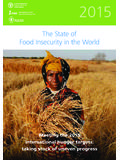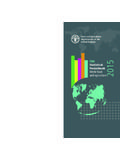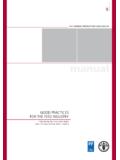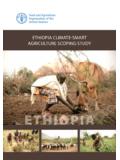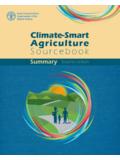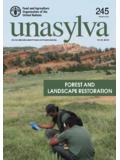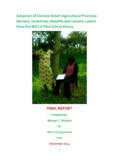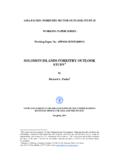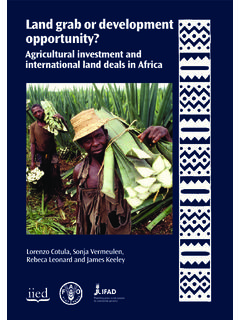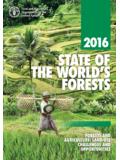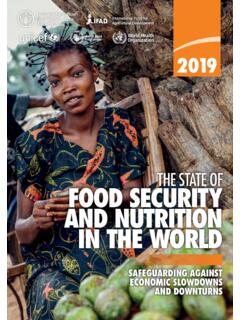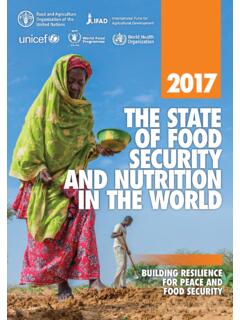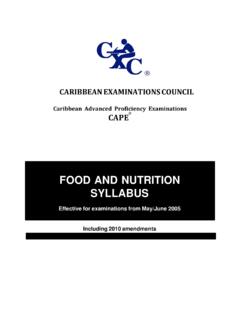Transcription of HLPE Report #14 - Food and Agriculture Organization
1 14 HLPE REPORTHLPEHigh LevelPanel of ExpertsHLPEHigh LevelPanel of ExpertsAgroecological and other innovative approachesA Report byThe High Level Panel of Expertson food security and NutritionJuly 2019for sustainable Agriculture and food systems that enhance food security and nutrition2 HLPE Reports series #1 Price volatility and food security (2011) #2 Land tenure and international investments in Agriculture (2011) #3 food security and climate change (2012) #4 Social protection for food security (2012) #5 Biofuels and food security (2013) #6 Investing in smallholder Agriculture for food security (2013) #7 Sustainable fisheries and aquaculture for food security and nutrition (2014) #8 food losses and waste in the context of sustainable food systems (2014) #9 Water for food security and nutrition (2015) #10 Sustainable agricultural development for food security and nutrition : what roles for livestock?
2 (2016) #11 Sustainable forestry for food security and nutrition (2017) #12 nutrition and food systems (2017) #13 Multi-stakeholder partnerships to finance and improve food security and nutrition in the framework of the 2030 Agenda (2018) #14 Agroecological and other innovative approaches for sustainable Agriculture and food systems that enhance food security and nutrition (2019) All HLPE reports are available at 3 HLPE Steering Committee members (2017 2019) Patrick Caron (Chairperson) Mahmoud El Solh (Vice-Chairperson) Martin Cole Louise O. Fresco Alex Godoy-Fa ndez Maria Kadle kov Eileen Kennedy Muhammad Khan Xiande Li Paul Mapfumo Mohammad Saeid Noori Naeini Elisabetta Recine Shiney Varghese Martin Yemefack Rami Zurayk HLPE Project Team members Fergus Lloyd Sinclair (Project Team Leader) Mary Ann Augustin Rachel Bezner Kerr Dilfuza Egamberdieva Oluwole Abiodun Fatunbi Barbara Gemmill Herren Abid Hussain Florence Mtambanengwe Andr Luiz Rodrigues Gon alves Alexander Wezel Coordinator of the HLPE variste Nicol tis This Report by the High Level Panel of Experts on food security and nutrition (HLPE) has been approved by the HLPE Steering Committee.
3 The views expressed do not necessarily reflect the official views of the Committee on World food security , of its members, participants, or of the Secretariat. The mention of specific companies or products of manufacturers, whether or not these have been patented, does not imply that these have been endorsed or recommended by the HLPE in preference to others of a similar nature that are not mentioned. This Report is made publicly available and its reproduction and dissemination is encouraged. Non-commercial uses will be authorized free of charge, upon request. Reproduction for resale or other commercial purposes, including educational purposes, may incur fees. Applications for permission to reproduce or disseminate this Report should be addressed by e-mail to with copy to Referencing this Report : HLPE. 2019. Agroecological and other innovative approaches for sustainable Agriculture and food systems that enhance food security and nutrition .
4 A Report by the High Level Panel of Experts on food security and nutrition of the Committee on World food security , Rome. 4 Contents Foreword .. 9 Summary and Recommendations .. 13 Summary .. 13 Agroecology: transition pathways towards sustainable food systems .. 13 Innovation for sustainable food systems .. 15 Diverging perspectives on how to achieve food system transformation .. 16 Design of institutional environments that support transitions towards SFSs .. 18 20 Recommendations .. 21 Introduction .. 25 Context and objective .. 25 Transition pathways and food system transformation .. 26 Structure of the Report .. 28 1 Agroecology: transition pathways towards sustainable food systems .. 31 Agroecology: a science, a set of practices and a social 31 Agroecology as a science .. 33 Agroecology as a set of practices .. 36 Agroecology as a social movement .. 38 Agroecology as an innovative approach to sustainable food systems for food security and nutrition .
5 39 Principles of 39 Contribution of agroecological approaches to food security and nutrition for rural consumers in low-income countries .. 43 Contested areas and knowledge gaps in 45 Political and social dimensions of food production .. 45 Difficulty in providing labels: illustration through the convergence with organic Agriculture .. 45 Can agroecology feed the world?.. 46 Knowledge 47 Knowledge gaps .. 48 Agroecological transitions to more sustainable food systems .. 49 2 Innovation for sustainable food systems .. 53 Innovation: concepts and definitions .. 53 Innovative approaches towards sustainable food systems for food security and nutrition .. 57 Transition towards sustainable food systems: emerging 65 Ecological footprint .. 65 Agency .. 66 5 A framework for harnessing innovative approaches to achieve food security and nutrition outcomes .. 66 3 Diverging perspectives on how to achieve food system transformation.
6 69 To what extent can innovative approaches embrace both small- and large-sized farms? .. 71 Revisiting economies of scale .. 72 Farm size and contributions to FSN .. 73 Farm size, social equity and well-being of farm communities .. 73 Farm size and nutrition .. 73 Farm size and innovation .. 74 Farm size, economic risks and 74 Farm size as a focus of policy .. 75 To what extent can modern biotechnologies contribute to transitions towards sustainable food systems for food security and nutrition ? .. 75 Modern biotechnologies, health and nutrition .. 76 Modern biotechnologies, health and safety .. 77 Modern biotechnologies, livelihoods and equity .. 78 Modern biotechnologies and the environment .. 79 Modern biotechnologies and agroecology .. 79 Prognosis .. 80 To what extent are digital technologies compatible with transitions towards sustainable food systems for food security and nutrition ?
7 80 Precision Agriculture .. 80 Big data .. 81 Automation and alternative web platforms .. 82 The digital divide, concentration of power and access to and control over digital technologies.. 82 Should synthetic inputs be eliminated or used judiciously to transition to sustainable food systems? The example of fertilizers .. 84 To what extent can biofortification be part of a transition strategy towards sustainable food systems for food security and nutrition ? .. 86 Biofortification, health and nutrition .. 86 Biofortification, livelihoods and equity .. 87 Should biodiversity be conserved in Agriculture or only in the wild? .. 87 Ways to foster innovation for transition towards sustainable food systems .. 89 4 Design of institutional environments to support transitions towards Sustainable food Systems .. 93 Performance measures and monitoring frameworks .. 94 Evaluation of agricultural practices across contexts and their impact on livelihoods.
8 94 Landscape-scale integration and the management of trade-offs and synergies among provision of ecosystem services .. 96 Metrics and monitoring frameworks for integrating production and consumption across whole food systems .. 99 6 Support transitions towards diversified and resilient food systems .. 100 Territorial management planning .. 101 Access to genetic resources .. 102 Promotion of healthy and diversified diets through an appropriate food environment .. 103 Supporting equitable and sustainable food value chains .. 104 Reducing food losses and waste .. 105 Knowledge generation and sharing .. 106 Public and private investment in research .. 107 Knowledge sharing, training and responding to community priorities .. 110 Agency and empowerment .. 110 Engage young people in Agriculture and food systems .. 112 Empower women and address gender inequality in food systems .. 114 Conclusion.
9 116 Acknowledgements .. 118 References .. 119 Appendices .. 147 A1 Innovative approaches to sustainable food systems for food security and nutrition .. 147 A. Rights-based approaches, encompassing food sovereignty, women s empowerment and right to food .. 147 B. Organic Agriculture .. 150 C. Agroforestry .. 152 D. Permaculture .. 153 E. Sustainable intensification .. 154 F. Climate-smart Agriculture .. 155 G. nutrition -sensitive Agriculture .. 155 H. Sustainable food value chains .. 156 I. Collation of principles across innovative 157 A2 The HLPE project cycle .. 161 7 List of Figures Figure 1 FSN in a human rights-based framework .. 27 Figure 2 Historical evolution of Agroecology .. 35 Figure 3 Five levels of transition towards SFSs and related principles of Agroecology .. 51 Figure 4 Multiple transition pathways .. 64 Figure 5 Framework for innovative approaches to SFSs for FSN .. 67 Figure 6 Dimensions of food systems, barriers to transitions towards SFSs and controversial issues.
10 70 Figure 7 Coordination between public and private stakeholders for knowledge generation and co-learning to foster innovation towards SFSs .. 90 Figure 8 Influence of public and private sector governance mechanisms on innovation .. 94 Figure 9 Division of labour for planting basins and traditional cultivation practices .. 95 Figure 10 Comparing mangrove and shrimp profitability: factoring non-marketed ecosystem services .. 97 Figure 11 Evolution of the global organic agricultural land (2000-2017) .. 151 Figure 12 Growth of the organic agricultural land by continent (2009-2017) .. 152 Figure 13 Development of the number of organic producers in the world (2000-2017) .. 152 Figure 14 HLPE project cycle .. 162 List of Definitions Definition 1 Transdisciplinary science .. 33 Definition 2 Agroecological approach to sustainable food systems for food security and nutrition .. 39 Definition 3 Innovation that fosters transitions towards SFSs for FSN.
